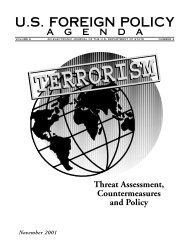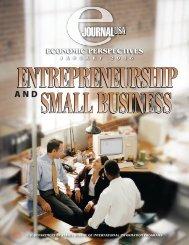s. history us history us history - Embassy of the United States
s. history us history us history - Embassy of the United States
s. history us history us history - Embassy of the United States
- No tags were found...
You also want an ePaper? Increase the reach of your titles
YUMPU automatically turns print PDFs into web optimized ePapers that Google loves.
CHAPTER 12: POSTWAR AMERICAOUTLINE OF U.S. HISTORYHARRY TRUMAN’SLEADERSHIPThe nation’s new chief executive,Harry S Truman, succeeded FranklinD. Roosevelt as president before<strong>the</strong> end <strong>of</strong> <strong>the</strong> war. An unpretentio<strong>us</strong>man who had previo<strong>us</strong>ly served asDemocratic senator from Missouri,<strong>the</strong>n as vice president, Trumaninitially felt ill-prepared to govern.Roosevelt had not disc<strong>us</strong>sed complexpostwar issues with him, and hehad little experience in internationalaffairs. “I’m not big enough for thisjob,” he told a former colleague.Still, Truman responded quicklyto new challenges. Sometimes impulsiveon small matters, he provedwilling to make hard and carefullyconsidered decisions on large ones.A small sign on his White Ho<strong>us</strong>edesk declared, “The Buck StopsHere.” His judgments about howto respond to <strong>the</strong> Soviet Union ultimatelydetermined <strong>the</strong> shape <strong>of</strong> <strong>the</strong>early Cold War.ORIGINS OF THE COLD WARThe Cold War developed as differencesabout <strong>the</strong> shape <strong>of</strong> <strong>the</strong> postwarworld created s<strong>us</strong>picion and distr<strong>us</strong>tbetween <strong>the</strong> <strong>United</strong> <strong>States</strong> and <strong>the</strong>Soviet Union. The first — andmost difficult — test case was Poland,<strong>the</strong> eastern half <strong>of</strong> which hadbeen invaded and occupied by <strong>the</strong>USSR in 1939. Moscow demanded agovernment subject to Soviet influence;Washington wanted a moreindependent, representative governmentfollowing <strong>the</strong> Western model.The Yalta Conference <strong>of</strong> February1945 had produced an agreement onEastern Europe open to different interpretations.It included a promise<strong>of</strong> “free and unfettered” elections.Meeting with Soviet Minister <strong>of</strong>Foreign Affairs Vyacheslav Molotovless than two weeks after becomingpresident, Truman stood firm onPolish self-determination, lecturing<strong>the</strong> Soviet diplomat about <strong>the</strong> needto implement <strong>the</strong> Yalta accords.When Molotov protested, “I havenever been talked to like that in mylife,” Truman retorted, “Carry outyour agreements and you won’t gettalked to like that.” Relations deterioratedfrom that point onward.During <strong>the</strong> closing months <strong>of</strong>World War II, Soviet military forcesoccupied all <strong>of</strong> Central and EasternEurope. Moscow <strong>us</strong>ed its militarypower to support <strong>the</strong> efforts <strong>of</strong><strong>the</strong> Communist parties in EasternEurope and cr<strong>us</strong>h <strong>the</strong> democraticparties. Communists took over onenation after ano<strong>the</strong>r. The processconcluded with a shocking coupd’etat in Czechoslovakia in 1948.Public statements defined <strong>the</strong>beginning <strong>of</strong> <strong>the</strong> Cold War. In 1946Stalin declared that internationalpeace was impossible “under <strong>the</strong>present capitalist development <strong>of</strong><strong>the</strong> world economy.” Former BritishPrime Minister Winston Churchilldelivered a dramatic speech in Fulton,Missouri, with Truman sittingon <strong>the</strong> platform. “From Stettin in<strong>the</strong> Baltic to Trieste in <strong>the</strong> Adriatic,”Churchill said, “an iron curtain hasdescended across <strong>the</strong> Continent.”Britain and <strong>the</strong> <strong>United</strong> <strong>States</strong>, hedeclared, had to work toge<strong>the</strong>r tocounter <strong>the</strong> Soviet threat.CONTAINMENTContainment <strong>of</strong> <strong>the</strong> Soviet Unionbecame American policy in <strong>the</strong>postwar years. George Kennan, atop <strong>of</strong>ficial at <strong>the</strong> U.S. embassy inMoscow, defined <strong>the</strong> new approachin <strong>the</strong> Long Telegram he sent to<strong>the</strong> State Department in 1946. Heextended his analysis in an articleunder <strong>the</strong> signature “X” in <strong>the</strong>prestigio<strong>us</strong> journal Foreign Affairs.Pointing to R<strong>us</strong>sia’s traditional sense<strong>of</strong> insecurity, Kennan argued that<strong>the</strong> Soviet Union would not s<strong>of</strong>tenits stance under any circumstances.Moscow, he wrote, was “committedfanatically to <strong>the</strong> belief that with <strong>the</strong><strong>United</strong> <strong>States</strong> <strong>the</strong>re can be no permanentmod<strong>us</strong> vivendi, that it is desirableand necessary that <strong>the</strong> internalharmony <strong>of</strong> our society be disrupted.”Moscow’s pressure to expandits power had to be stopped through“firm and vigilant containment <strong>of</strong>R<strong>us</strong>sian expansive tendencies. ...”The first significant application<strong>of</strong> <strong>the</strong> containment doctrine camein <strong>the</strong> Middle East and eastern Mediterranean.In early 1946, <strong>the</strong> <strong>United</strong><strong>States</strong> demanded, and obtained, afull Soviet withdrawal from Iran,<strong>the</strong> nor<strong>the</strong>rn half <strong>of</strong> which it hadoccupied during <strong>the</strong> war. That summer,<strong>the</strong> <strong>United</strong> <strong>States</strong> pointedlysupported Turkey against Soviet demandsfor control <strong>of</strong> <strong>the</strong> Turkishstraits between <strong>the</strong> Black Sea and<strong>the</strong> Mediterranean. In early 1947,American policy crystallized whenBritain told <strong>the</strong> <strong>United</strong> <strong>States</strong> thatit could no longer afford to support<strong>the</strong> government <strong>of</strong> Greece against astrong Communist insurgency.In a strongly worded speech toCongress, Truman declared, “I believethat it m<strong>us</strong>t be <strong>the</strong> policy <strong>of</strong> <strong>the</strong><strong>United</strong> <strong>States</strong> to support free peopleswho are resisting attempted subjugationby armed minorities or by outsidepressures.” Journalists quicklydubbed this statement <strong>the</strong> “TrumanDoctrine.” The president askedCongress to provide $400 million foreconomic and military aid, mostlyto Greece but also to Turkey. Afteran emotional debate that resembled<strong>the</strong> one between interventionistsand isolationists before World WarII, <strong>the</strong> money was appropriated.Critics from <strong>the</strong> left later chargedthat to whip up American supportfor <strong>the</strong> policy <strong>of</strong> containment, Trumanoverstated <strong>the</strong> Soviet threat to<strong>the</strong> <strong>United</strong> <strong>States</strong>. In turn, his statementsinspired a wave <strong>of</strong> hystericalanti-Communism throughout <strong>the</strong>country. Perhaps so. O<strong>the</strong>rs, however,would counter that this argumentignores <strong>the</strong> backlash that likelywould have occurred if Greece, Turkey,and o<strong>the</strong>r countries had fallenwithin <strong>the</strong> Soviet orbit with no oppositionfrom <strong>the</strong> <strong>United</strong> <strong>States</strong>.Containment also called for extensiveeconomic aid to assist <strong>the</strong> recovery<strong>of</strong> war-torn Western Europe.With many <strong>of</strong> <strong>the</strong> region’s nationseconomically and politically un-260261












